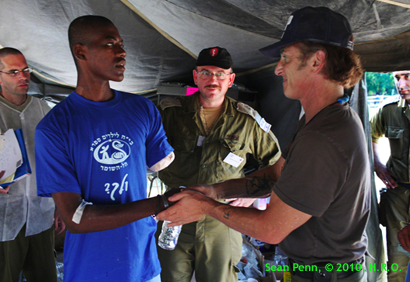
One of the finest actors of our time, Sean Penn is also a
humanitarian and human rights activist which is something to be
proud of on all accounts. He stars next in the political thriller
Fair Game (2010) with Naomi Watts, which premiered May 20th at
the Cannes Film Festival in France. He missed promoting
the film at the festival, to instead attend a Senate hearing in
which he has been asked to testify concerning the condition of
Haiti, of which he has been actively donating his time, money,
and labor to assist lives there since the devastating earthquake
there this year. He tells us here about his work in this regard,
and why so much more is needed.
Q. How long have you been over there in Haiti
Sean?
A. SEAN PENN: I've been here almost two weeks.
We have spontaneously formed an NGO (non government organization)
called the (Penn) Haitian Relief Organization. The idea was to
(just) bring seven doctors down. We have a total of 30 people,
relief workers. And then after three days in an abandoned house,
we were able to get our doctors working. We saw helicopters
overhead landing nearby, and explored the area and found out it
was where the 82nd Airborne had their base at Petionville camp,
where there's about 60,000 people in a displacement camp there.
And so they were gracious enough to let us camp on the perimeter
of their base and then to contribute incredible encouragement and
assets. So we were able to get to where we had as many as 30
doctors at a time and we do tailgate strikes with the military in
the morning. We take them over to the DMACC clinic and now have a
full hospital functioning at the camp. All of this with the
support of Lieutenant Colonel Foster. And so we're just treating
patients. We've done three food distributions and building every
day in a situation that needs a lot more building…
Q. What is the biggest challenge now in
Haiti?
A. SEAN PENN: The rain. When the rain comes,
it's going to be a public health disaster. That could easily be
on the scale of the earthquake itself. Disease is spreading
already, tuberculosis, typhoid, tetanus, malaria. This place, you
know, which already had incredible hygiene problems within the
neighborhoods, now with the earthquake, this is a new disaster
waiting to happen.
Q. Do you think this issue, Haiti is fading from
the American view as compared to when it first happened?
A. SEAN PENN: It can't fade. Americans are an
utter failure if it fades. And America won't be a failure. I've
seen this military and I know the military won't be able to stay
here for an endless period of time, but if the military can have
the kind of human conscience it has had with a humanitarian
disaster, the people and the media have to stay interested. And if we don't, we have failed the governments of the world,
rather than the other way around. It's time to show the
governments that we can do it, because no government can handle
this by itself. (…) I was at Katrina. And Katrina, you
know, so many people said it's not what you saw on television. It
was a horrible thing that happened there. So many people lost so
much. But you really could see it on television. This is
something like nobody I've talked to has ever seen before. This
is an apocalyptic city, and these are some of the most resilient
souls in the entire planet and for them to be challenged like
this is for us to help them.
Q. Its very generous of you to do so much
here…
A. SEAN PENN: Well, you know, everyone
contributes in the way that they can. In my case, you know, I'm
in a very fortunate position to be able to afford the ticket.
Then when I did that with Katrina, I met some people who had some
more experience than I did in disaster relief issues, and those
were the few people that I called originally. And by that time I
had had some experience and certainly given a lot of thought to a
lot of it and talked to a lot of people about it and learned what
I thought would be a valuable thing to bring. And then you just
come in and you find that there's obviously new challenges and
new disasters. But what happened was I called those couple of
people.
(…) So the next thing, four people turned into 30 on an
airplane full of supplies and doctors, and that 30 people has
turned into many more. And on top of that, the treatments of tens
of thousands of patients that we've encountered, (…) we
had transports going all through the night. Again, the food
distributions that we do sometimes on our own, sometimes with the
military when it's a larger amount of people (are important). But
there's an endless amount of contribution that people can make on
all levels. And number one, and really the challenge is on the
people that do what you do (in the media). I think that, you
know, after a period of shame in the media and the news coverage
that allowed a war to happen that shouldn't have happened, I
think that now it's time that there can't be the question anymore
about whether this is going to fade or not. It's up to the media
to not let it fade. It can't fade. These are our neighbors, and
these are strong great people who have been through too much for
too long. We cannot let it happen.
Q. Thank you.
A. SEAN PENN:
www.jphro.org
© 2010, The Hollywood Sentinel.